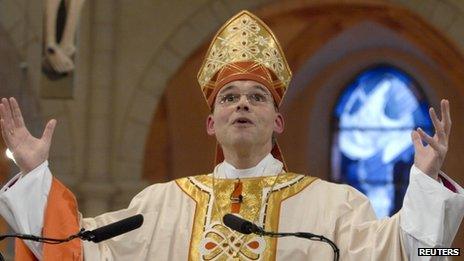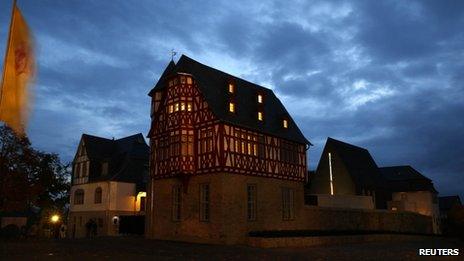Profile: Bishop Franz-Peter Tebartz-van Elst
- Published

Bishop Franz-Peter Tebartz-van Elst has been suspended for an unknown period
Dubbed the "bishop of bling" by German media, Franz-Peter Tebartz-van Elst has been suspended by the Vatican over claims of excessive spending.
The Bishop of Limburg was ordered to leave his diocese for an "appropriate period" after a meeting with the Pope following a scandal about the spiralling costs of a multi-million-dollar renovation of his official residence.
He is accused of spending 31m euros (£26m; $42m) on the development, which was originally costed at 5.5m euros.
The bishop - and his alleged spending habits - has become infamous in Germany, where many people pay tax to the Catholic Church.
Calls were made for his resignation after he was accused of lying under oath about taking a first-class flight to India to visit the poor.
The bishop, 53, has apologised for any upset caused but denied any wrongdoing.
'Sad story'
But the claims have caused controversy in Germany, where five centuries ago Martin Luther launched the Reformation in Europe in response to what he said were excesses and abuses within the Church.
The issue over transparency in church finances has also struck a chord as German Catholics pay a tax, which brings in billions of euros a year to the German church.
"This is really a very, very sad story about the Church in Germany," Christian Weisner of German Catholic lay organisation We are Church told the BBC.
"After the sexual abuse scandal, discovered three years ago, this is a second bomb[shell] ... With this huge and enormously costly building of a new bishop's house - of more than 30m euros - the whole Catholic Church lost its credibility."

The new residence includes a private chapel that reportedly cost 2.9m euros
Bishop Tebartz-van Elst was born in the village of Twisteden in north-west Germany in 1959.
He has described himself as being a loner as a child, preferring to read rather than help on his family's farm, according to the German newspaper Der Zeit, external.
He was ordained as a priest in 1985 and named auxiliary bishop of Munster in 2003 by Pope John Paul II.
In an article for Deutsche Welle, external, German Catholic theologian David Berger says Bishop Tebartz-van Elst was a "professor of liberal ideas" while in Munster.
But this changed under Pope Benedict, he says, and he came to believe in the dominant authority of bishops.
Bishop Tebartz-van Elst is now viewed as belonging to a conservative wing of the German episcopate, which emphasises traditional Catholic values and liturgical forms.
Since taking office in March, Pope Francis has urged the Church to promote frugality and simplicity, and repeatedly expressed his disapproval of senior clerics whose lifestyles seem a little too lavish.
Daniel Deckers, the Catholic Affairs editor of the Frankfurter Allgemeine Zeitung, says it is this change in attitude which will decide the bishop's future.
"There are really some bishops that behave as if there is no person who can accuse them, so there is no problem with their way of life," he told the BBC.
"These times have come to an end. There is a general sense within the Church that we have to come to terms with the rule of law, with accountability and with governance within the Church - and that is a healthy process."
- Published23 October 2013
- Published4 October 2013
- Published14 October 2013